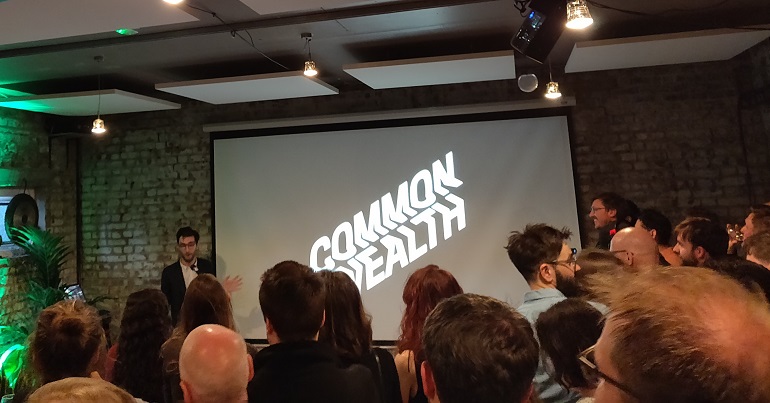This new think tank has radical ideas for transforming our economy

A new radical think tank has launched with the backing of leading politicians and social movement campaigners. Common Wealth aims to develop new models of democratic ownership for a sustainable economy. Its launch was ‘warmly welcomed’ by Labour’s Shadow Chancellor John McDonnell, Green MP Caroline Lucas and former Labour leader Ed Miliband (who sits on the advisory board). Likewise, campaigners from across political parties joined activists and researchers in welcoming Common Wealth at a launch event at Newspeak House in London.
The think tank has been founded by Mathew Lawrence, a former senior research fellow on IPPR’s Commission on Economic Justice and co-author of the Inclusive Ownership Fund in NEF’s ‘Co-Operatives Unleashed’ paper. The Inclusive Ownership Fund, a key Common Wealth policy, requires private companies with over 250 workers to contribute to a collectively managed fund. It was announced by John McDonnell at Labour conference last year, and is widely regarded as one of the most radical Labour policy proposals to date.
The success of Lawrence’s Inclusive Ownership Fund is a marker for Common Wealth’s ambition. In the coming months, they will publish a detailed plan for democratising corporate ownership, a roadmap for how a radical Green New Deal can transform our economy in the face of climate breakdown, and a Barcelona inspired plan for reshaping ownership of data and digital infrastructure.
The need for a think tank producing ideas for a democratic economy is huge. As the neoliberal consensus rapidly decays, there is increasing grassroots energy to demand economies beyond privatisation and the market. Having solidified their base, movements behind leaders like Jeremy Corbyn and Bernie Sanders now need fleshed out proposals for an economy that managed by the many not the few.
Democratic ownership and climate change
Common Wealth have decisively framed the need to transform ownership in the context of climate and wider environmental breakdown. They join campaign group Labour for a Green New Deal in making the case for public and democratic ownership of the economy as an essential solution to the climate crisis.
It has become clear that an economy where private profit is king cannot transition to a green economy on the scale or timeframe we require to avoid runaway climate change. Private companies have been aware of their role in causing the crisis for decades. They have done criminally little to contribute to decarbonisation. It is time to reimagine the place of democracy in managing the economy. Where companies motivated by profit have failed, workers and communities motivated by enjoying prosperous lives and a sustainable planet can succeed.
The need for new infrastructure on the left
There is of course a strong left-wing tradition of advocating public and democratic ownership. Aside from popular stereotypes about top-down statist forms of socialism, the economy is different now to when those models were theorised. The climate crisis, growing digital economy and our experience of neoliberalism’s rise and fall provide the impetus for new ideas for a new economy.
Why, though, does the left need another think tank to advocate for these ambitions? Shouldn’t we just get to work campaigning for them?
Not quite. Our goal should be to transform the economy more profoundly and more rapidly that even the neoliberals did. The story of the Mont Pelerin society is oft repeated. Their plan to populate economic theory with neoliberal ideas through a multitude of think tanks was a core part of mainstreaming their ideas. The left should not seek to replicate the neoliberals in every way. But we can learn that movement infrastructure like think tanks are vital to producing and popularising the ideas campaigners can organise for.
Common Wealth joins initiatives like Autonomy and We Own It in the UK and Democracy Collaborative in the US in heralding a renaissance in progressive organisation taking up this mantle in the age of insurgent democratic socialism.
By cultivating relationships both with leading policy-makers in political parties representing those movements as well as campaigners on the ground, Common Wealth can mediate a dialogue between the base and electoral leadership of movements. Engaging with both, they can hear and interpret demands of the grassroots, understand the strategy and direction of parties, and articulate the interests of both into practical proposals that campaigners can demand and parties can implement in government.
The Green New Deal is a pertinent example of where this is desperately needed. Groups like Labour for a Green New Deal are providing the energy and organising capacity behind the broad principles of the economy we need. Common Wealth is perfectly placed to substantiate those principles into robust policy that a Bernie Sanders Presidency or Corbyn-led Labour government could use to transform the economy.



Leave a Reply